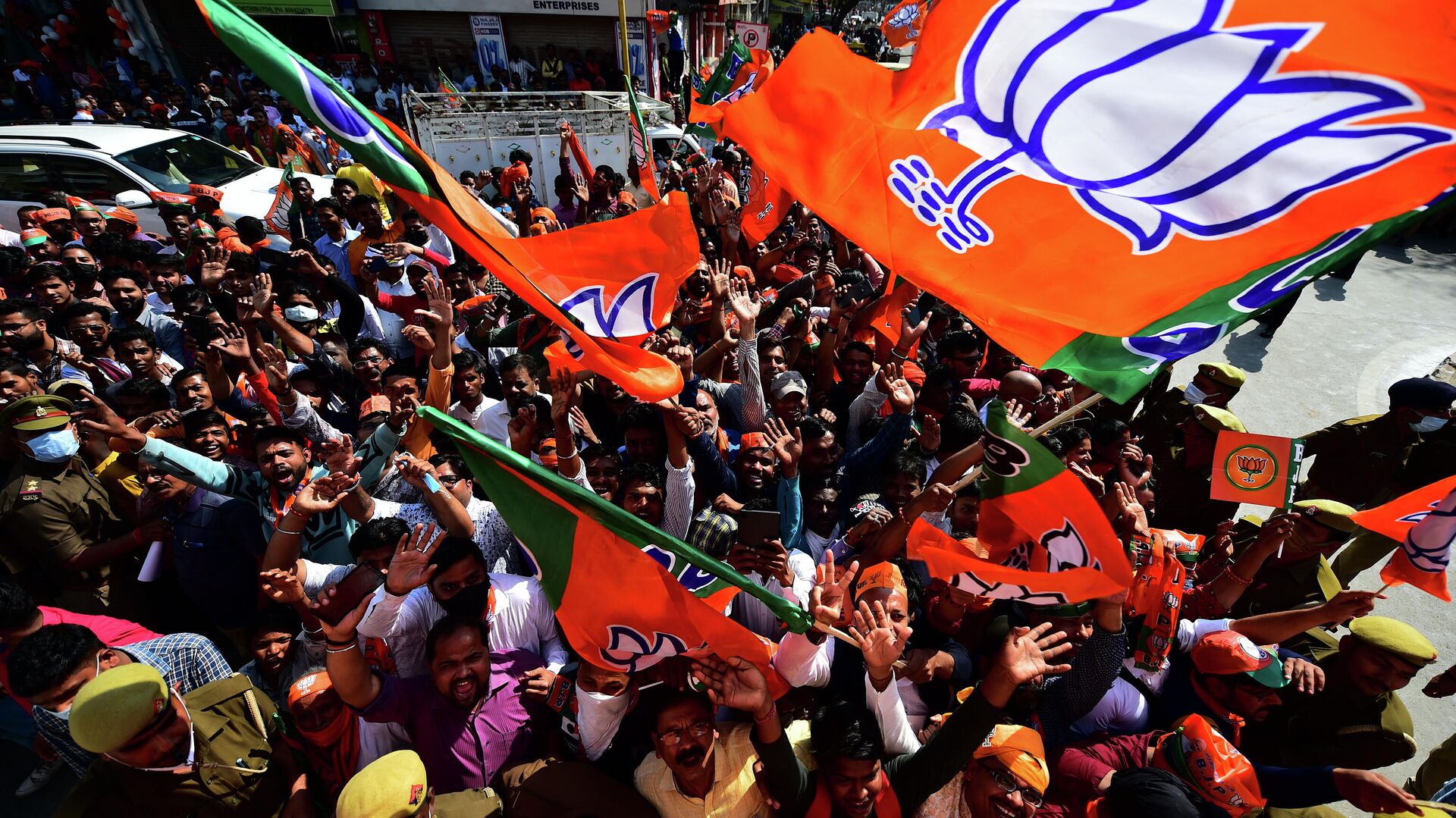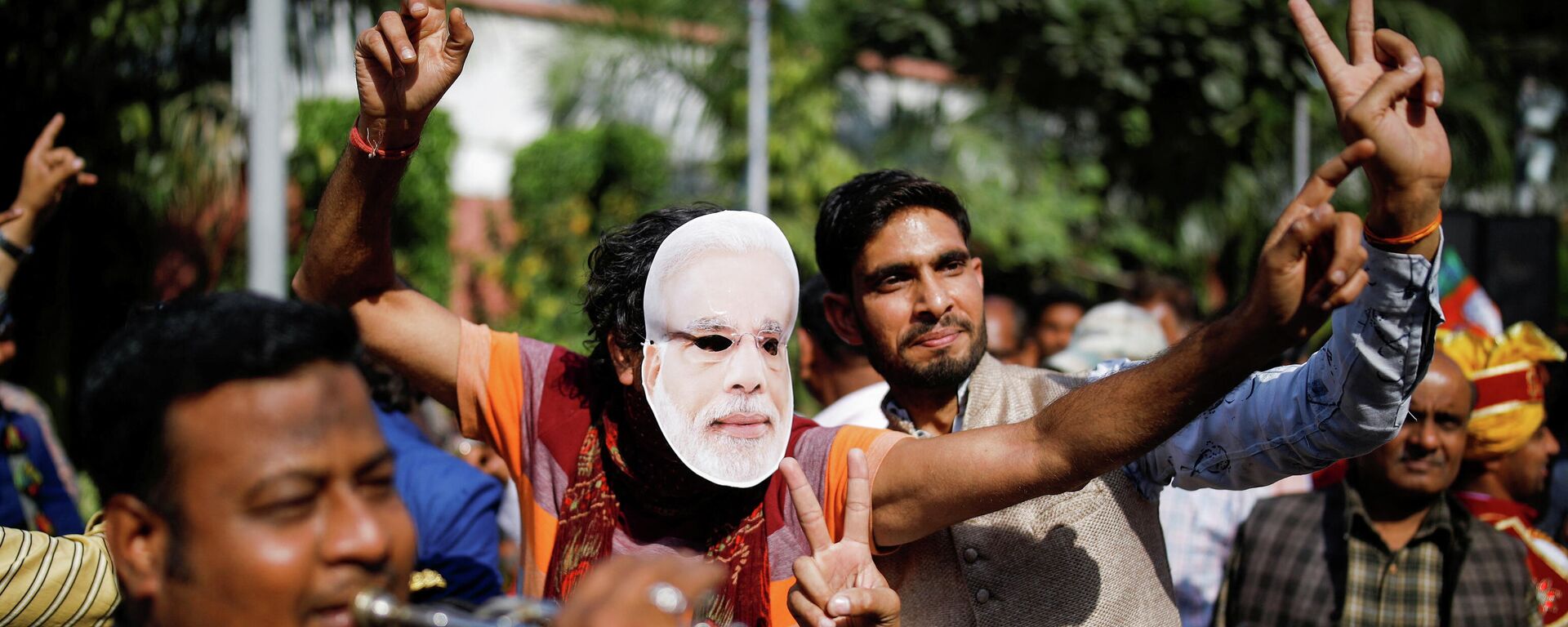https://sputnikglobe.com/20220323/could-indias-regional-parties-present-a-real-challenge-for-modi-bjp-in-2024-national-polls-1094104808.html
Could India's Regional Parties Present a Real Challenge for Modi, BJP in 2024 National Polls?
Could India's Regional Parties Present a Real Challenge for Modi, BJP in 2024 National Polls?
Sputnik International
Although the BJP and Congress are seen as India's national parties at the moment, regional parties have started to make their presence felt. There are 10... 23.03.2022, Sputnik International
2022-03-23T12:50+0000
2022-03-23T12:50+0000
2022-12-10T11:42+0000
politics
bharatiya janata party (bjp)
indian national congress
narendra modi
mamata banerjee
aam aadmi party
congress
https://cdn1.img.sputnikglobe.com/img/07e6/03/07/1093660919_0:134:3076:1864_1920x0_80_0_0_bd4dd5470a85e1dab114ad7f61efca23.jpg
Telangana state chief K Chandrashekhar Rao has exhibited fresh vigour in his attempt to bring together various opposition parties against the ruling Bharatiya Janata Party (BJP), as he braces himself, like others, for the 2024 parliamentary elections.On Monday, Rao, who is leader of Telangana Rashtra Samithi (TRS), was seen with one of the finest political strategists in the country, Prashant Kishor, who worked with the BJP in 2014.Rao has already met the state chiefs of West Bengal, Mamata Banerjee, Tamil Nadu, M. K. Stalin, and other political leaders in the past.The TRS leader also told reporters that he was working with Kishor and other non-BJP leaders to come up with an alternative to the federally ruling BJP in the 2024 national elections, since he feels there is a vacuum for a leader in the country.This is not the first time a regional party has expressed its desire to rival the BJP.Earlier this month, Banerjee, who as well as being West Bengal's state chief leads the Trinamool Congress (TMC) party, hinted at a coalition, as she eyes the 2024 polls.Meanwhile, Tamil Nadu state chief Stalin is cooperating with non-BJP state chiefs and other opposition leaders to form a national platform against the federally ruling party.Maharashtra's ruling alliance leader and Nationalist Congress Party (NCP) chief Sharad Pawar has also hinted that a more weighty alliance could rule the country in 2024.All these leaders have met Kishor several times. However, it is not yet confirmed whether Congress and the Aam Aadmi Party (AAP) were part of the discussions or not.Despite the BJP's recent triumph in four of the five states during the legislative assembly elections, the regional parties have shown their intention to retain their territories and expand into other states.For instance, the way Uttar Pradesh state's main opposition party - the Samajwadi Party - put up an impressive fight during the legislative assembly polls against the BJP is a case in point. Although the party managed to double its votes, it fell short of the more than 40 percent vote that helped the BJP to emerge triumphant.A group of political experts doubt whether regional leaders such as Arvind Kejriwal, Mamata Banerjee and others can really challenge a national-level leader like Prime Minister Narendra Modi of the BJP."This is a very wrong assessment in the context of a country such as India, and Prime Minister Modi was himself a very good regional leader until 2013," Subhash Palshikar, a political commentator, told Sputnik.He further explained that the BJP's electoral dominance is based on grassroots level communication with its workers, organisational work, media control and money. Prime Minister Modi's charisma and oratory skills act as a catalyst."How are regional parties going to overcome this?" Palshikar asked.Delhi-based senior journalist Abid Shah said there are many issues which the opposition has failed even to raise with the public such as the mishandling of the COVID-19 pandemic, or the continued underperformance of the economy, contributing to rising inflation and poverty and subdued employment growth. But the opposition even fails to raise the issues properly."As of now, I don't see them emerging as an alternative to the BJP in 2024. But two years is enough time. Let's see if they can do any good," Shah said.Though not ruling out the possibility that regional leaders can play a "national role" in future, political pundit Sanjaya Baru, said that, in the past, regional leaders have played a national role in Indian politics.He said: "In the Eighties, when (late Congress party leader) Indira Gandhi's fame was at its zenith, it was Andhra Pradesh State Chief Nandamuri Taraka Rama Rao, also known as NTR, who mobilised regional leaders including Vishwanath Pratap Singh (who later became Prime Minister of the country), Muthuvel Karunanidhi (Tamil Nadu leader), Jyoti Basu (West Bengal leader), Farooq Abdullah (Kashmiri leader) and challenged Indira Gandhi."
https://sputnikglobe.com/20220311/state-poll-triumph-indicates-stamp-of-approval-for-modis-vision-says-bjp-media-panellist--1093769850.html
Sputnik International
feedback@sputniknews.com
+74956456601
MIA „Rossiya Segodnya“
2022
Deexa Khanduri
https://cdn1.img.sputnikglobe.com/img/07e4/0c/1e/1081607388_0:0:961:960_100x100_80_0_0_e9e931b8c1e18fb41f3074e2145d7a3a.jpg
Deexa Khanduri
https://cdn1.img.sputnikglobe.com/img/07e4/0c/1e/1081607388_0:0:961:960_100x100_80_0_0_e9e931b8c1e18fb41f3074e2145d7a3a.jpg
News
en_EN
Sputnik International
feedback@sputniknews.com
+74956456601
MIA „Rossiya Segodnya“
Sputnik International
feedback@sputniknews.com
+74956456601
MIA „Rossiya Segodnya“
Deexa Khanduri
https://cdn1.img.sputnikglobe.com/img/07e4/0c/1e/1081607388_0:0:961:960_100x100_80_0_0_e9e931b8c1e18fb41f3074e2145d7a3a.jpg
politics, bharatiya janata party (bjp), indian national congress, narendra modi, mamata banerjee, aam aadmi party, congress
politics, bharatiya janata party (bjp), indian national congress, narendra modi, mamata banerjee, aam aadmi party, congress
Could India's Regional Parties Present a Real Challenge for Modi, BJP in 2024 National Polls?
12:50 GMT 23.03.2022 (Updated: 11:42 GMT 10.12.2022) Deexa Khanduri
Sputnik correspondent
Although the BJP and Congress are seen as India's national parties at the moment, regional parties have started to make their presence felt. There are 10 regional party-led state or Union Territory governments that are no part of the BJP alliance. And although Congress runs two states, the BJP and allies govern 18 states and Union Territories.
Telangana state chief K Chandrashekhar Rao has exhibited fresh vigour in his attempt to bring together various opposition parties against the ruling Bharatiya Janata Party (BJP), as he braces himself, like others, for the 2024 parliamentary elections.
On Monday, Rao, who is leader of
Telangana Rashtra Samithi (TRS), was seen with one of the finest political strategists in the country, Prashant Kishor, who worked with the BJP in 2014.
Rao has already met the state chiefs of
West Bengal, Mamata Banerjee, Tamil Nadu, M. K. Stalin, and other political leaders in the past.
The TRS leader also told reporters that he was working with Kishor and other non-BJP leaders to come up with an alternative to the federally ruling BJP in the 2024 national elections, since he feels there is a vacuum for a leader in the country.
This is not the first time a regional party has expressed its desire to rival the BJP.
Earlier this month, Banerjee, who as well as being West Bengal's state chief leads the Trinamool Congress (TMC) party, hinted at a coalition, as she eyes the 2024 polls.
"All parties should walk together if they want to defeat the BJP in 2024," Banerjee said.
Meanwhile, Tamil Nadu state chief Stalin is cooperating with non-BJP state chiefs and other opposition leaders to form a national platform against the federally ruling party.
Maharashtra's ruling alliance leader and Nationalist Congress Party (NCP) chief Sharad Pawar has also hinted that a more weighty alliance could rule the country in 2024.
All these leaders have met Kishor several times. However, it is not yet confirmed whether Congress and the Aam Aadmi Party (AAP) were part of the discussions or not.
Despite the BJP's recent triumph in four of the five states during the legislative assembly elections, the regional parties have shown their intention to retain their territories and expand into other states.
For instance, the way Uttar Pradesh state's main opposition party - the Samajwadi Party - put up an impressive fight during the legislative assembly polls against the BJP is a case in point. Although the party managed to double its votes, it fell short of the more than 40 percent vote that helped the BJP to emerge triumphant.
A group of political experts doubt whether regional leaders such as Arvind Kejriwal, Mamata Banerjee and others can really challenge a national-level leader like
Prime Minister Narendra Modi of the BJP.
"This is a very wrong assessment in the context of a country such as India, and Prime Minister Modi was himself a very good regional leader until 2013," Subhash Palshikar, a political commentator, told Sputnik.
He further explained that the BJP's electoral dominance is based on grassroots level communication with its workers, organisational work, media control and money. Prime Minister Modi's charisma and oratory skills act as a catalyst.
"How are regional parties going to overcome this?" Palshikar asked.
"Even if these parties form alliances, the main question remains 'Who will lead them?' Leaders like Mamata Banerjee, Sharad Pawar and others are not the leaders of the Hindi heartland — North, West and Central India. The AAP which is ruling in Punjab and Delhi, has yet to prove itself before going nationwide," Palshikar added.
Delhi-based senior journalist Abid Shah said there are many issues which the opposition has failed even to raise with the public such as the mishandling of the COVID-19 pandemic, or the continued underperformance of the economy, contributing to rising inflation and poverty and subdued employment growth. But the opposition even fails to raise the issues properly.
"As of now, I don't see them emerging as an alternative to the BJP in 2024. But two years is enough time. Let's see if they can do any good," Shah said.
Though not ruling out the possibility that regional leaders can play a "national role" in future, political pundit Sanjaya Baru, said that, in the past, regional leaders have played a national role in Indian politics.
He said: "In the Eighties, when (late Congress party leader) Indira Gandhi's fame was at its zenith, it was Andhra Pradesh State Chief Nandamuri Taraka Rama Rao, also known as NTR, who mobilised regional leaders including Vishwanath Pratap Singh (who later became Prime Minister of the country), Muthuvel Karunanidhi (Tamil Nadu leader), Jyoti Basu (West Bengal leader), Farooq Abdullah (Kashmiri leader) and challenged Indira Gandhi."
"If NTR could challenge Indira Gandhi, Mamata Banerjee and Chandrashekhar Rao can also challenge Narendra Modi by building a coalition of parties. One cannot underestimate their role and power," Baru added.



